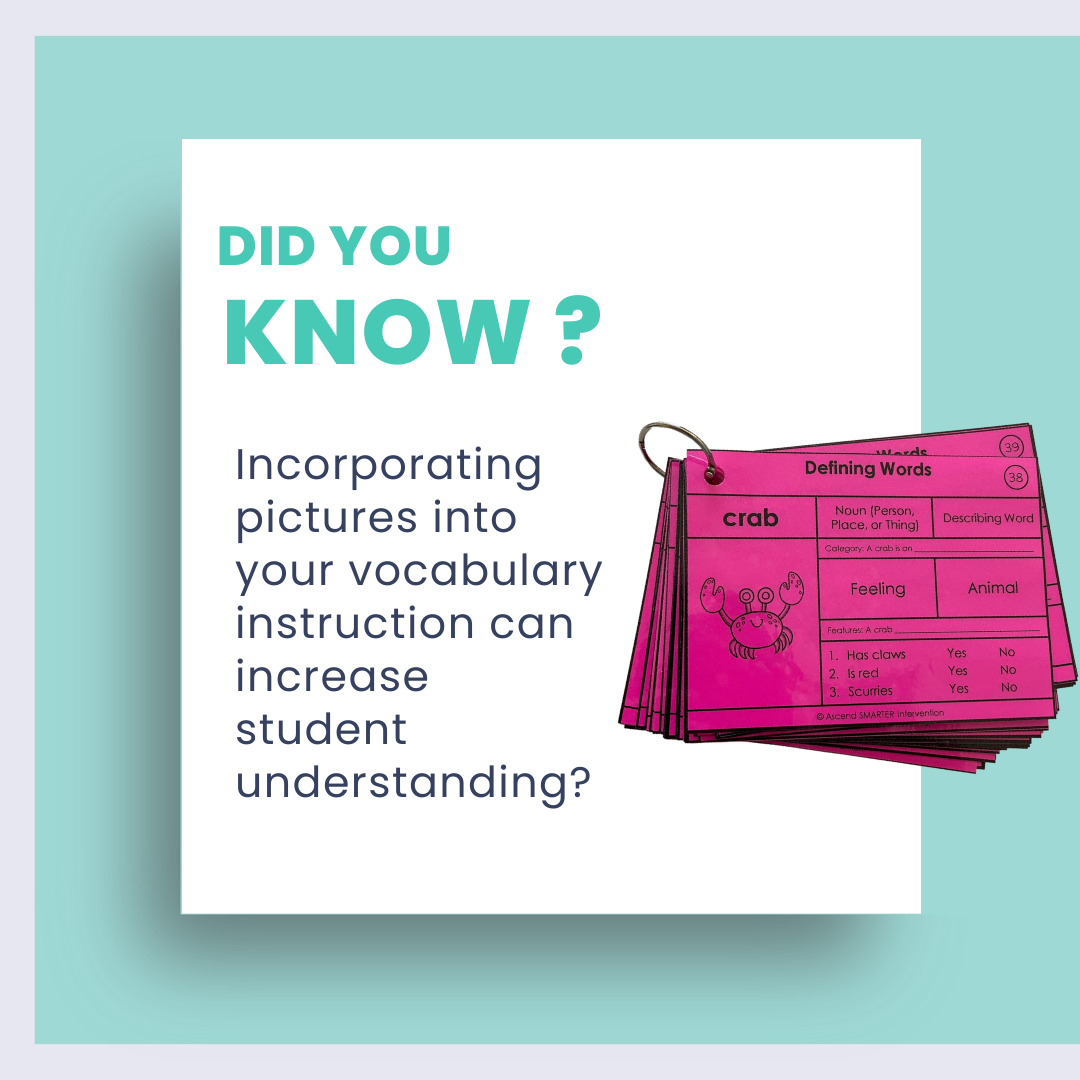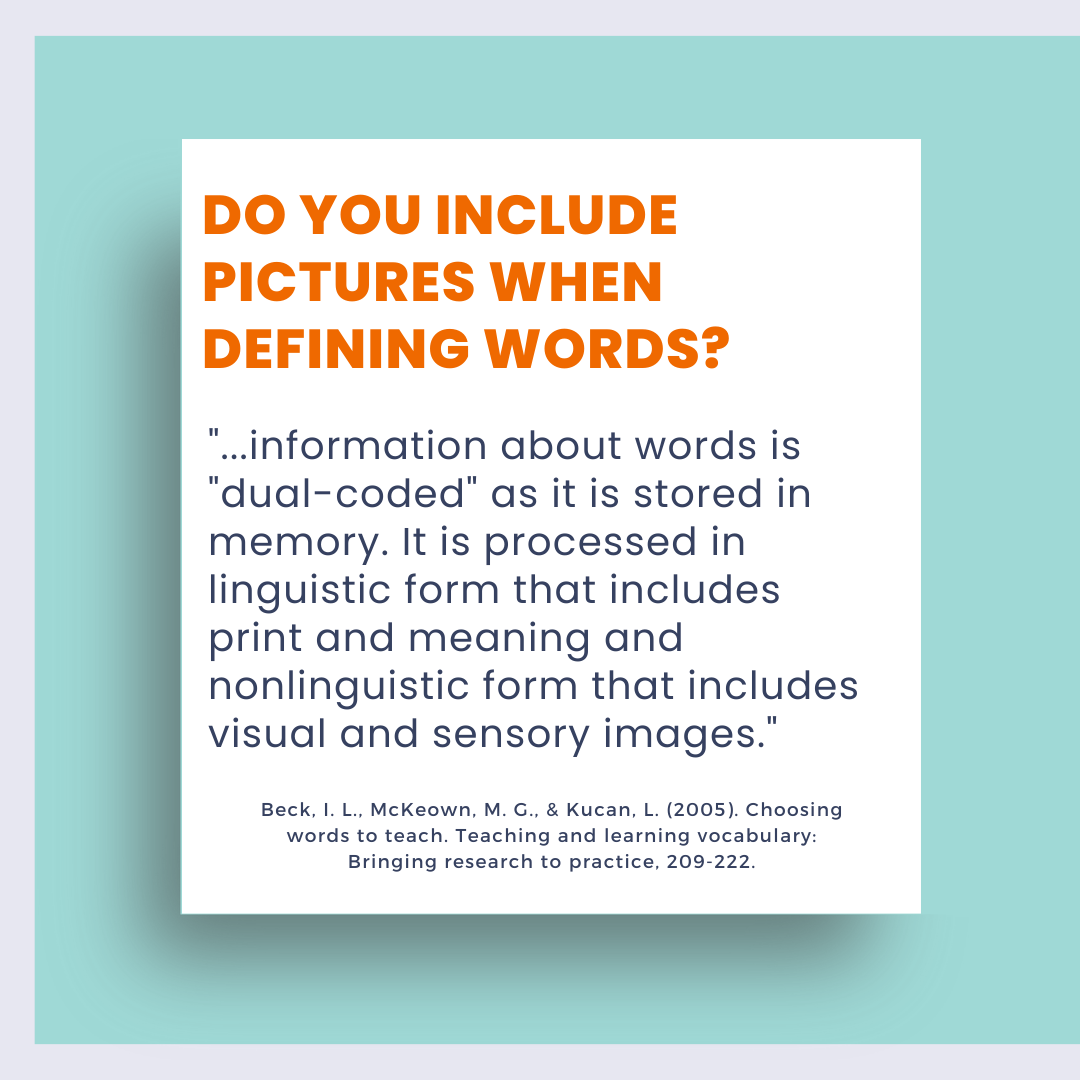The Best Strategy to Develop Vocabulary Knowledge
We all remember it, right?
A stack of flashcards rubber-banded together. A word on one side, definitions on another. Quizzing our friends at lunch just trying to learn the words in time for our vocabulary tests.
…only to forget them as the bell rang and we went on to our next class.
When it comes to vocabulary instruction, rote memorization of definitions has been the go-to strategy for students for a looooooong time. While this flashcard strategy can be an effective way to learn new words, it ultimately isn't effective for long-term retention.
This is important because students need to develop solid vocabulary skills for a number of reasons.
First, vocabulary is going to support decoding.
If a student is sounding out a word correctly but cannot recognize it as a real word, they will struggle to decode it. For example, I recently had a student try to decode "vegetation." This word was unfamiliar to her, so even though she was decoding it correctly, she couldn't make the leap from the sound/syllable levels to the word level. Instead, she started guessing other words that she thought would be close (like veterinarian, vegetable, etc.).
Vocabulary has also been linked to fluency and comprehension.
Up to 70-80% of comprehension stems from being able to understand the words in the text (Bromley, 2007). The ability to decode words and read a passage is only the first step. Vocabulary is necessary if we want students to be successful.
So…what do we do? How do we best support vocabulary if we don't use the flashcard method?
Instead of having students memorize definition after definition…
we use a vocabulary framework to help them fully develop an understanding of a word. Within this framework, we have students identify a word's…
category
function/purpose/features
a synonym
an antonym/shade of meaning
Let's try this with "spoon."
We want our category to be as specific as possible. So, as we work to define “spoon,” we might start with "it's a noun." More specifically, it is a thing. Even more specifically, it is a utensil.
Then, we look at a spoon's function/purpose/features. What do we use it for? What does it look like? We use a spoon to eat. It has a curved base and a long handle.
To help solidify this picture in our brains, we use a synonym as an anchor. This should be another word in the same category with a function close to that of our target word. The key here is to use a word students are familiar with so that they can really anchor their knowledge. A spoon is like a fork.
Then, we use an antonym (if there is a clear opposite) or we'll pull a shade of meaning to explain how our target word is different than our synonym. A spoon is like a fork but it has a solid base instead of prongs.
The great part about this framework is…
that students can provide answers that are at their level of understanding. For example, one child may say, "A spoon is a thing I use to eat. It's like a fork but for soup and ice cream." Whereas another child may say, "A spoon is a metal or plastic utensil used to eat soft foods or soups. It is like a shovel but smaller."
Both children would be correct.
This helps children fully define words in a way that makes sense to them based on their existing knowledge. It is important that they rely on their own schema and use words they already understand to generate their definitions if we want long-term retention. Otherwise, they may memorize the Meriam Webster definition: "Spoon - noun. An eating or cooking implement consisting of a small shallow bowl with a relatively long handle." and forget it immediately after.
How do students fill out the vocabulary framework if they don't already know what the word means?
Great question! One of our favorite strategies is to show them an image of the word. If a student sees a picture of a spoon or a person using a spoon to eat, they can begin to generate a definition themselves. Depending on their vocabulary abilities, they may need more or less support in this area.
So, to summarize, instead of looking up definitions and memorizing them, we use a vocabulary framework that helps students anchor word meanings to their existing knowledge to support long-term vocabulary retention.
Alert - free vocabulary resource!
Click below to grab your own copy of our vocabulary framework and vocabulary knowledge rating scale!
Then, check out the video below to learn more.





